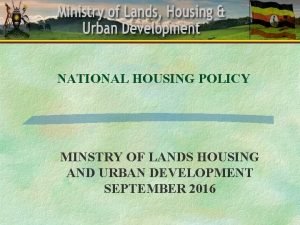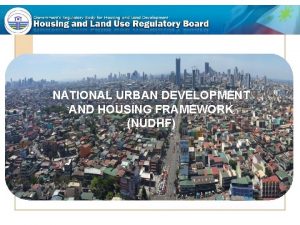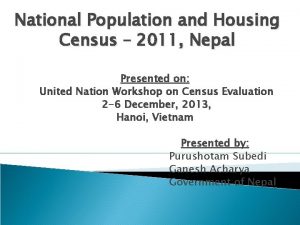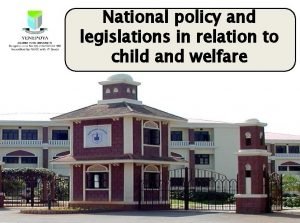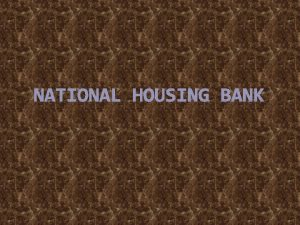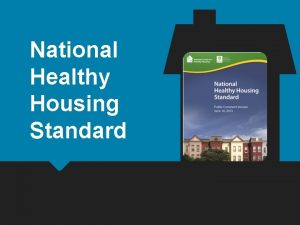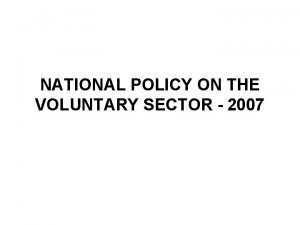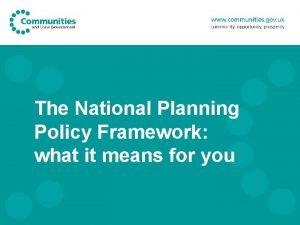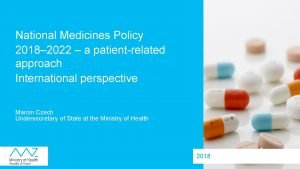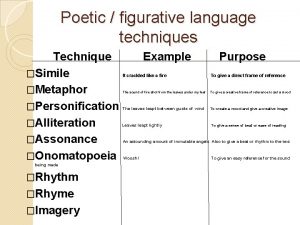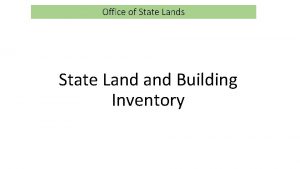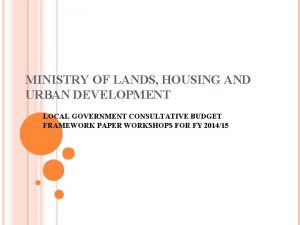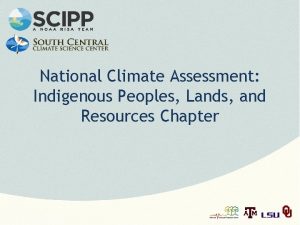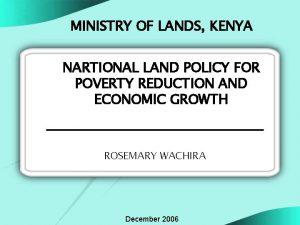NATIONAL HOUSING POLICY MINSTRY OF LANDS HOUSING AND











































- Slides: 43

NATIONAL HOUSING POLICY MINSTRY OF LANDS HOUSING AND URBAN DEVELOPMENT SEPTEMBER 2016

WORLD HABITAT DAY 2016 Every first Monday o f October, the UN marks World Habitat Day In Uganda, the Day will be marked on 3 rd October at Imperial Royale Hotel, Kampala Theme for this year in Uganda is Adequate Housing for all. For 2015, theme was Public space for all while in 2014 it was Voices from slums.

MISSION & VISION OF THE MINISTRY Our Vision is “Sustainable Land Use, Land Tenure Security, Affordable, Decent Housing and Organized Urban Development”. The Mission is “To ensure sustainable land management, planned urban and rural development and decent housing for all”.

MINISTRY MANDATE PROVIDING POLICY DIRECTION, SETTING NATIONAL STANDARDS AND CORDINATION OF ALL MATTERS RELATED TO LANDS, HOUSING & URBAN DEVELOPMENT IN THE COUNTRY. GOVERNMENT COMMINTMENT Government is committed to support investments in real estates sector by; § § Providing enabling policies and regulations to facilitate investors in the sector, National Housing Policy, Real Estates Policy, Physical Planning Standards and guidelines, Landlords/ Tenants Bill, PPP Bill, etc Providing tax incentives for big investments in the sector Providing Land for big investments, Facilitating securing Land rights & Security of tenure

CURRENT STATE OF HOUSING IN UGANDA

In Uganda especially in urban areas the majority of the people are struggling with a housing deficit that is increasing each year. The recent housing census report shows that Uganda has a total of 7. 3 m households with a backlog of approx. 2. 1 million housing units. The majority of the 7. 3 m households (i. e. 84%) are for the poor and made of temporary dwellings.

The majority of urban residents are low income earners and currently live in unplanned slum neighborhoods that consist mostly of informal rental housing. See some of the pictorials in slums of Kampala below.

SLUM AREAS NEAR KAMPALA Slums in Uganda are characterized by; o Unplanned development with poor housing facilities sitting on prime lands o Lack of planned and developed infrastructure such as roads, water, sewerage etc o Un healthy conditions o Widespread urban poverty, o Insecurity, crime etc o Increasing urban sprawl o Traffic congestion o Pollution and inadequate supply of social services.

FAMOUS KASOKOSO SLUM AREA

Housing in Uganda is largely market and private sector – led, The majority of private developers who build new housing facilities or real estates only provide units that are affordable to the minority of the wealthy population leaving out the majority of the Urban population of Uganda.

THE NEW NATIONALHOUSING POLICY

VISION & GOAL VISION: Adequate Housing for All. GOAL: Provide a framework that provides adequate housing for all.

OBJECTIVES Increase the production of adequate housing for all income groups. Improve the quality of the existing housing stock Increase access to affordable housing Improve security of land tenure Improve mechanisms for development & management of real estate industry

CONNECTION OF POLICY TO OTHER GOVT PROGRAMMES The implementation of this Policy stems from other Government development programs such as; the National Development Plan II Vision 2040; and the NRM Manifesto 2016 – 2021 and other development agendas with regard to contributing towards achieving the sustainable development goals of this country.

KEY ISSUES TO BE ADDRESSED BY THE NATIONAL HOUSING POLICY Adequate Housing for All Harmonizing Laws, Regulations, Policies for housing development Framework for effective house delivery Planned and Serviced housing development Housing Finance Infrastructure Services

The new Housing Policy seeks to promote progressive realization of adequate housing for all and is premised on the principle of partnership, between Government, the Private sector, Land owners, financial institutions, cooperatives and individuals.

ROLE OF GOVERNMENT The role of Government is largely to provide a conducive policy, legislative and regulatory framework for policy implementation, monitoring and evaluation and its periodical review for effective and efficient policy implementation.

PROMOTION OF PARTENRSHIPS Under the partnership framework on policy implementation, the Government will provide key inputs such as serviced land with access roads, electricity, water and sewerage, as well as leverage access to affordable financing for housing development.

PRIORITY AREAS OF THE NATIONAL HOUSING POLICY In order to kick start the implementation of the policy, in the interim, priority will be to mainstream the construction of houses for the Army, Police, Prisons, Teachers and Medical workers. This will be under the institutional housing arrangement. The current institutional housing for the above categories is terrible. See below:

SOME EXAMPLES OF CURRENT INSTITUTIONAL HOUSING FOR MEDICAL WORKERS AND PRISONS STAFF


ARMY HOUSES COMMONLY KNOWN AS MAMA INGIYA POLE


The Ministry has developed an institutional housing programme starting with housing for UPDF which has a deficit of 30, 000 houses. The proposed approach for funding is through a three pronged approach including; use of consolidated Fund resources, Loan from Shelter Afrique and partnership with private investors.

ESTABLISHMENT OF A REVOLVING FUND The policy also gives priority to the establishment of a mortgage revolving fund to enable public servants access mortgages and concession interest rates. The funds for this will come form the accrued funds from the sale of pool housing currently with Housing Finance Bank of Uganda.

LAND BANKING FOR URBAN HOUSING The policy promotes urban housing interventions and encourage Urban Authorities to put in place measures to provide adequate and affordable housing. This will require urban authorities to put aside planned land for housing development. Due to scarcity of land, high rise apartments will be encouraged. See below.

PROMOTION OF HIGH RISE APARTMENTS

PROMOTION OF PUBLIC PRIVATE PARTNERSHIP The Policy also promotes Public Private Partnerships (PPP) in housing development where the land owners are encouraged to provide private land for mass production of housing as well as real estate development. Through PPP, the private sector investors and financial institutions are also encouraged to provide funding and technology for Housing Development/ Real Estate development. .

NATIONAL HOUSING CONSTRUCTION COMPANY PROJECTS DEVELOPED THROUGH PRIVATE PARTNERSHIP Established in 1964 Owned by Go. U 51%, Libya 49% Below are some of the projects being constructed by National Housing Construction Company through partnership with private investors and financiers.

SPRING APARTMENTS, BUGOLOBI

NAALYA PRIDE

NAMUNGOONA PHASE 1

PROPOSED BUKERERE PROJECT, FOR OVER 3, 000 LOW COST HOUSING

PHASE 1 LUBOWA PROJECT

CONTRIBUTION OF HOUSING TO THE ECONOMY The Government has provided this policy framework to enable all stakeholders appreciate the emerging opportunities in the housing sector so as to contribute towards transformation of the economy for the realization of this country’s vision.

CONTRIBUTION TO ECONOMY The Ministry is keen to have enough funds to promote housing development in the country because it has economic multiplier effects on economic development of the country through; Employment generation Poverty reduction Boosting of building materials industries Promotion of secure tax base for individuals and Government

KEY INTERVENTIONS NEEDED BOOST THE HOUSING INDUSTRY • provide infrastructure and utility services to projects for affordable housing • Government needs to support access to off shore cheap project finance (Guarantee) • Waiver of import duty on building technologies and materials for affordable housing • Capitalizing banks to provide end buyer mortgage financing • Encourage more Local Developers to commit to the housing Sector

KEY INTERVENTIONS BEING UNDERTAKEN • Introduction of low cost housing technology • Capitalization of National Housing and Construction Company • Establishment of Long term , affordable and sustainable credit for housing • Enactment of bills: Landlord – Tenant bill, The Real Estates Bill, The National Housing Bill

EARTHQUAKES AND DISASTERS 3 Fault lines Western Uganda Rift Valley Katonga river Aswa River Government is going to issue guidelines on housing standards in earth quake prone areas

Effects of earth quake in Rakai

ROLE OF THE MPS To popularize the policy in your constituencies and lobby municipalities and local authorities to provide planned and serviced land for housing Support Government housing projects and increase the budget for housing Support a motion to have a rethink on housing as a priority area. Support the above proposed Government interventions and other proposals

Together, we can make life BRIGHTER and BETTER

 Minstry of housing
Minstry of housing Nudhf
Nudhf National population and housing census 2011
National population and housing census 2011 National child policy 1974
National child policy 1974 Chapter 21 harsh and arid lands
Chapter 21 harsh and arid lands A 747 jetliner lands and begins
A 747 jetliner lands and begins Function of nhb
Function of nhb National healthy housing standard
National healthy housing standard Objective of zoo
Objective of zoo Existanxe
Existanxe National policy on the voluntary sector 2007
National policy on the voluntary sector 2007 National education policy 1998 to 2010 in pakistan
National education policy 1998 to 2010 in pakistan Dr. kanupriya chaturvedi
Dr. kanupriya chaturvedi Dr. kanupriya chaturvedi
Dr. kanupriya chaturvedi The national policy
The national policy What is national planning policy framework
What is national planning policy framework National medicines policy
National medicines policy Conclusion of sarva shiksha abhiyan
Conclusion of sarva shiksha abhiyan A national policy of avoiding involvement in world affairs
A national policy of avoiding involvement in world affairs Mayan lands
Mayan lands Grasslands food web
Grasslands food web Sahtu lands
Sahtu lands Close to the sun in lonely lands figurative language
Close to the sun in lonely lands figurative language My sojourn in the lands of my ancestors
My sojourn in the lands of my ancestors What was life like for the jews in greek-ruled lands
What was life like for the jews in greek-ruled lands Chapter 27 section 3 european claim muslim lands
Chapter 27 section 3 european claim muslim lands Chapter 27 section 3 european claim muslim lands
Chapter 27 section 3 european claim muslim lands Chapter 10 section 3 acquiring new lands
Chapter 10 section 3 acquiring new lands Acquiring new lands
Acquiring new lands Chapter 11 section 3 european claim muslim lands
Chapter 11 section 3 european claim muslim lands Europeans claim muslim lands
Europeans claim muslim lands Between 1859 and 1893 vietnam
Between 1859 and 1893 vietnam Flat lands that have only small changes in elevation
Flat lands that have only small changes in elevation Moderately restricted use lands
Moderately restricted use lands Ll bean vs lands end
Ll bean vs lands end Public lands corps hiring authority
Public lands corps hiring authority Green lands blue waters
Green lands blue waters Vikings origin
Vikings origin Metaphor vs personification
Metaphor vs personification Louisiana office of state lands
Louisiana office of state lands Important agricultural lands hawaii
Important agricultural lands hawaii What is mldp
What is mldp Spokane lands council
Spokane lands council Sustainable agricultural lands conservation program
Sustainable agricultural lands conservation program
